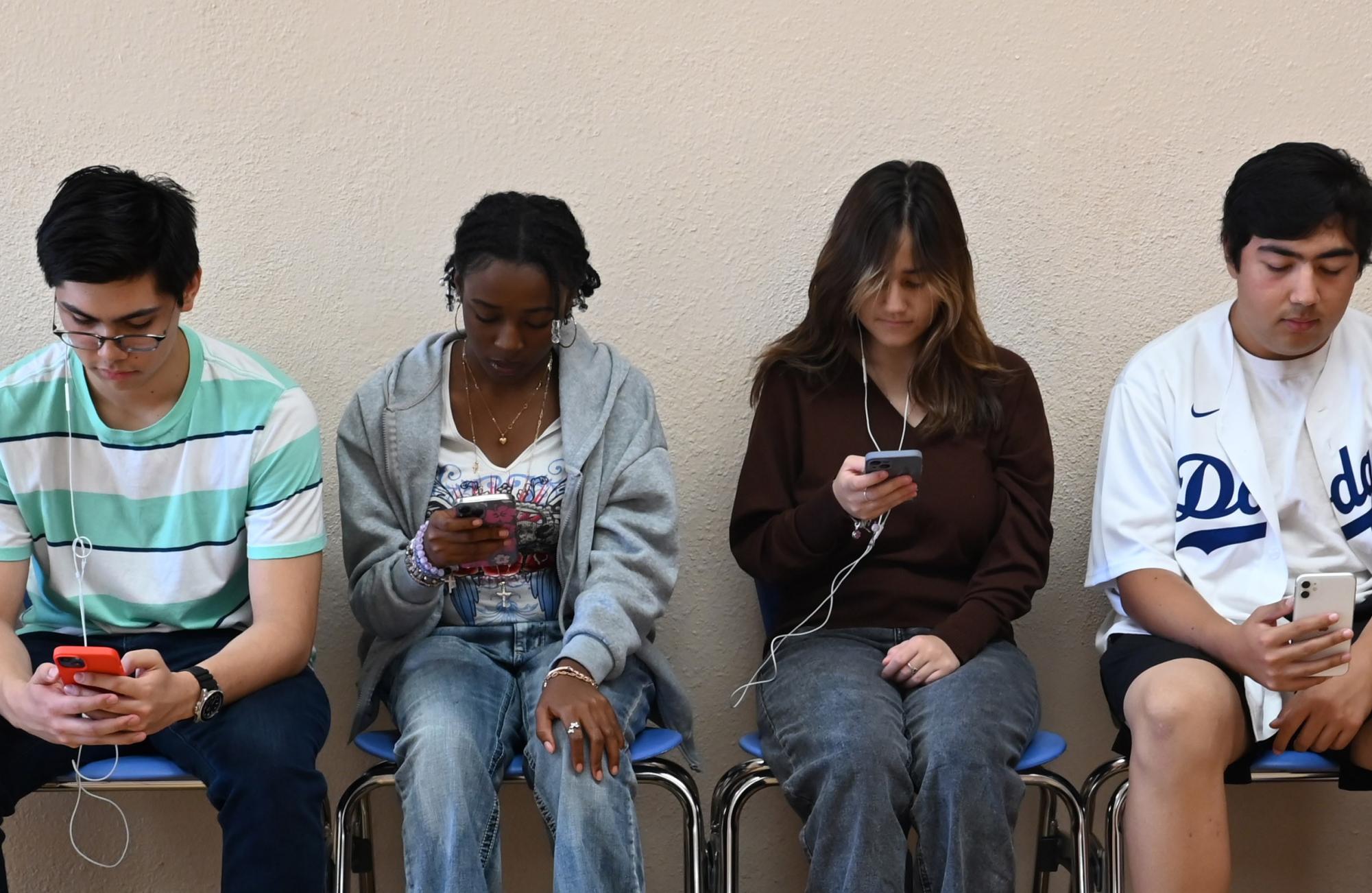A feral beast lurks on the screen of something we use every day: our phones. This monster demands ceaseless attention, bombarding us with the ping of Instagram notifications and the vibrations of new messages. We know it has a deadly bite, and yet we perpetually stare into its eyes and swipe our fingers through its fur.
Haunting us at school, home, the local grocery store and even the quiet moments before we sleep, this beast wears many different masks. But we know all of its faces as social media.
stargirl and froggin_out liked your photo.
itslizzy08 just posted a new video.
therealpotato sent you a message.
Sound familiar? These are the messages that draw us in every second, and the clamor of these notifications is growing far too loud.
Demanding constant attention and thriving on distraction, social media incessantly breathes down our necks, spreading misinformation, insecurity and killing face-to-face interaction. It feeds on many, but teenagers are a particular delicacy for this ravenous monster. If we don’t tame social media use, it may just swallow us whole.
Instagram, YouTube and TikTok have become the stars of our generation. Their names are on the lips of every teenager, and their outlandish trends are taking over just about every imaginable thing in the juvenile lifestyle.
According to The Mirror’s survey, 20 percent of students polled have an average daily screen time between one and three hours. 48 percent of students polled have a daily screen time between four and six hours, and a whopping 31 percent of students have an average screen time greater than seven hours a day. Astoundingly, zero percent of students who responded to the poll have a screen time below one hour.
Very few benefits can be found in the basket of social media, as numerous studies indicate that social media is highly distracting, disrupts sleep and fuels peer pressure. Moreover, media sites are notorious for spreading harmful content, providing a platform for misinformation and misconceptions surrounding body image.
Depression and anxiety are burning topics among young individuals, and social media dumps fuel into the fire of these severe mental health issues. According to a 2019 study conducted by the Mayo Clinic, American teenagers who spent over three hours on social media daily were at increased risks of severe mental health and well-being issues, including dejection and emotional instability.
The art of face-to-face interaction has been lost to the pre-Instagram era. Eyes are now drawn to screens like magnets. Social media provides a tempting incentive to not look at the people around us, a tried and true method of ruining relationships. According to Psychology Today, innumerable benefits can be reaped from direct communication, including enhanced personal connections, mastering articulation and establishing stronger trust.
Speaking from experience, cultivating relationships face to face houses much more meaning than online connections. A friend of mine lives in Korea, and it’s difficult to remain close to her when our few conversations take place through texts on a screen. My relationships with the friends I spend time with in person every week are much more intimate and hold greater significance to my heart.
Social media is stealing the gift of in-person communication from us. Ironically enough, social media is making the technologically connected generation out of touch with one another.
Not only is social media ruining teenagers’ relationships, but it is also damaging their futures. Many occupations require strong verbal communication skills, and social media’s discouragement of face-to-face interaction hinders teenagers from unlocking their full social potential.
Along with fentanyl, nicotine and cocaine, social media deserves a slot on the list of the world’s deadliest drugs. Platforms like Instagram and TikTok trigger surges of dopamine that drive individuals to perpetually post, comment, like and scroll.
A study conducted by Cross River Therapy in 2023 reveals that approximately 70 percent of teenagers and young adults in the United States have a social media addiction. Addiction is a poison, barely noticeable until it begins to infect the entire body. By the time you notice it, removing it from your system is nearly impossible.
Addiction to social media is being unable to remove yourself from the short videos and Instagram posts. Feeling that constant tug to open your phone and scroll through your feed can sorely affect your social capabilities. Social skills are necessary for building strong relationships. With intense electronic dependency, losing touch with yourself and others is highly probable.
Let’s face it: social media is wrecking livelihoods. On top of shattering self-esteem and happiness, social media addiction is also the ultimate weapon against academic success. According to the National Library of Medicine, adolescent addiction can result in memory and attention deficits, decreasing academic performance while increasing the risk of drawbacks in school.
Is there anything good about social media? Sure. Social media provides methods to communicate with family and friends, join positive causes and raise awareness surrounding pressing issues. An abundance of so-cute-it-hurts animal videos can be found lurking online, plus entertaining edits that make you laugh to the point of suffocation. However, after considering the cons of social media, addiction and depression are not worth the cat videos and Instagram likes.
Take a break from scrolling, turn off the notifications and spend time with your loved ones. Find a new hobby, or regulate the amount of time you spend on social media. Consider limiting the number of times you post each day. Peace, satisfaction and confidence will magically be restored in your life, and you’ll never regret living your best life offline.
The abridged version of this article appeared in the Fall 2023 print edition. This is an uncut version.




